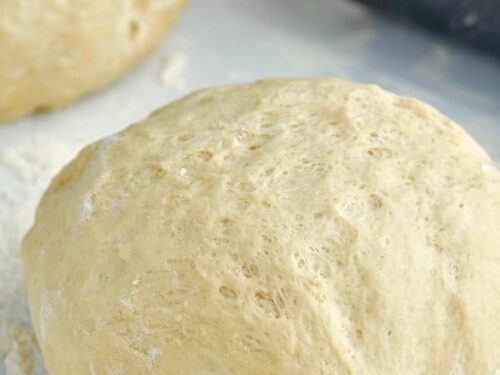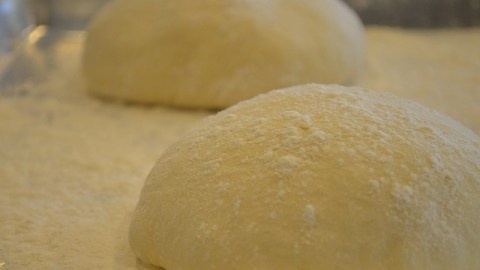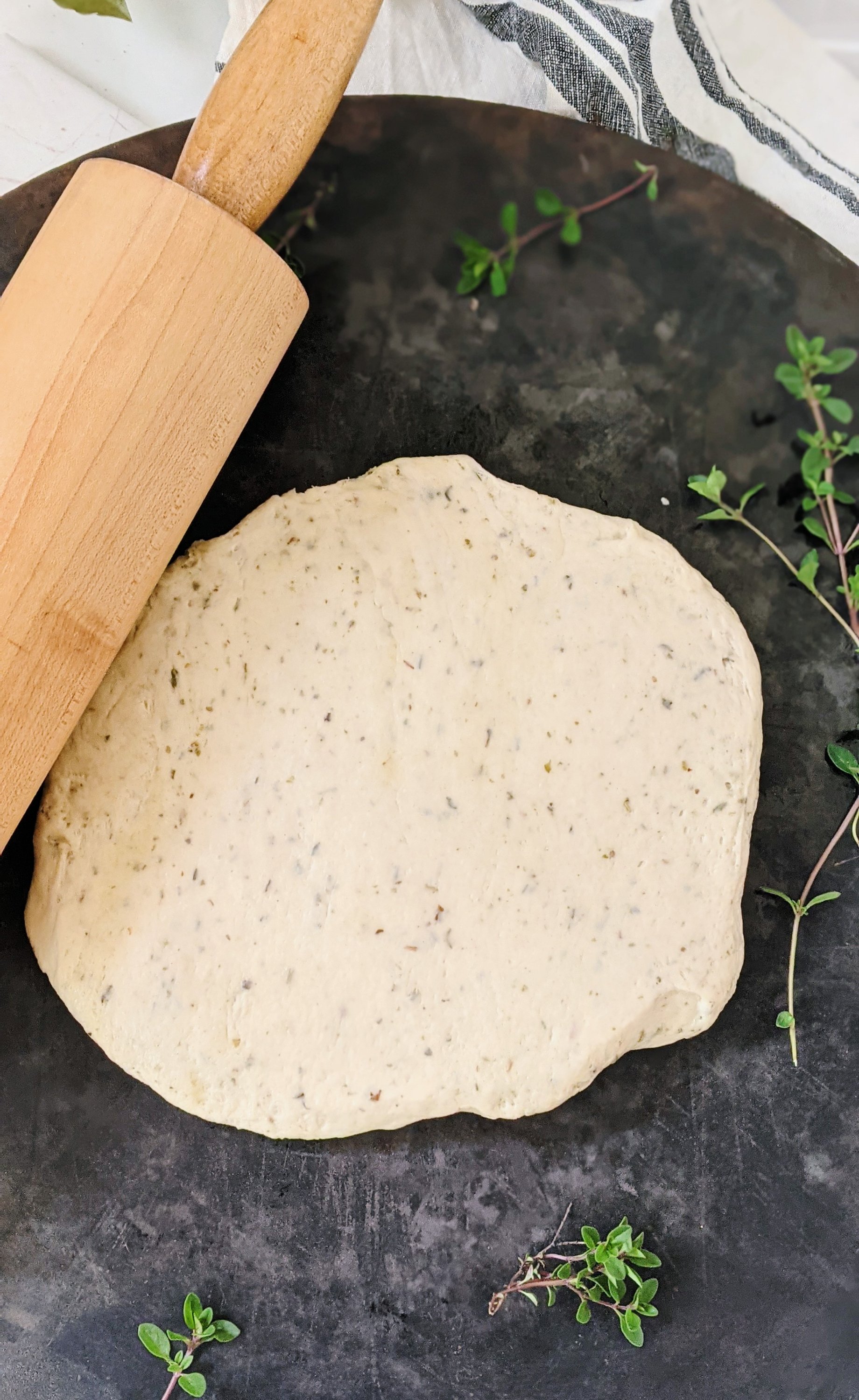Introduction

If you’re a pizza lover or someone who enjoys baking, you may have wondered about the ingredients that go into making pizza dough. Pizza has become a beloved food worldwide, and its popularity has led to a growing interest in homemade pizza-making. One common question that arises when making pizza dough is whether eggs are included in the recipe. In this article, we will uncover the secret ingredients of pizza dough and address the misconception surrounding the use of eggs in its preparation. So, let’s dive in and discover the truth about pizza dough ingredients!
Rising Popularity Of Homemade Pizza
Homemade pizza has seen a surge in popularity in recent years. More and more people are choosing to make their own pizzas at home, as it allows for customization and control over the ingredients. With the rise of cooking shows and online recipes, making pizza from scratch has become more accessible to home cooks. Additionally, homemade pizza offers a fun and interactive activity for families and friends to enjoy together. The satisfaction of creating a delicious pizza from start to finish has contributed to the growing trend of homemade pizza-making.
Common Misconceptions About Pizza Dough Ingredients
There are some common misconceptions about the ingredients used in pizza dough. One misconception is that eggs are a staple ingredient in pizza dough. However, the truth is that most pizza dough recipes do not include eggs. Another misconception is that oil is a required ingredient in pizza dough. While some recipes may call for oil, it is not necessary for the dough to turn out well. It is important to dispel these misconceptions and understand the true ingredients that make up delicious pizza dough.
Basic Ingredients Of Pizza Dough

The basic ingredients of pizza dough consist of flour, water, yeast, and salt. Flour serves as the foundation, providing structure and texture to the dough. Water is essential for hydrating the flour and activating the yeast. Yeast plays a crucial role in fermentation, resulting in a light and airy crust. Salt enhances the flavor and helps control the fermentation process. These simple ingredients work together to create the perfect canvas for any pizza topping.
Flour And Water: The Foundation Of Pizza Dough
Flour and water are the fundamental ingredients that serve as the foundation of pizza dough. Flour provides structure and texture to the dough, giving it the necessary elasticity to stretch and rise. Water is essential for hydrating the flour and activating the yeast. The combination of flour and water creates a sticky, malleable dough that can be shaped into a pizza crust. The ratio of flour to water may vary depending on the desired consistency of the dough, but these two ingredients are the building blocks of every delicious pizza.
Yeast And Salt: Essential Ingredients For Fermentation And Flavor
Yeast and salt play crucial roles in the fermentation and flavor development of pizza dough. Yeast is responsible for the dough’s rise and creates carbon dioxide gas, which creates air pockets and gives the crust its light and airy texture. It also adds a distinct flavor to the dough during the fermentation process. Salt, on the other hand, not only enhances the taste of the dough but also regulates yeast activity and strengthens the gluten structure. Together, yeast and salt are essential for achieving the perfect crust and flavor in pizza dough.
Does Pizza Dough Contain Eggs?

Contrary to popular belief, traditional pizza dough does not typically contain eggs. The main ingredients in pizza dough are yeast, flour, and water. While some recipes may call for eggs as a binding agent, it is not a necessary component. However, it is always wise to check the ingredients or ask about potential egg content, as variations in pizza dough recipes can exist. Additionally, for those with dietary restrictions or preferences, there are alternatives and substitutes available for making egg-free or vegan pizza dough.
Debunking The Myth: Exploring The Role Of Eggs In Pizza Dough
Contrary to popular belief, eggs do not play a significant role in traditional pizza dough. The main purpose of eggs in baking is to add moisture and richness to the dough. However, pizza dough is typically made without eggs to achieve a light and airy texture. While some recipes may call for eggs as a binding agent, they are not necessary for a delicious pizza crust. It is always important to read the ingredients or ask about potential egg content to ensure it aligns with dietary preferences or restrictions.
Understanding Variations In Pizza Dough Recipes
One of the great things about pizza dough is its versatility. There are countless variations in pizza dough recipes, allowing you to customize your dough to your preferences. Some recipes may incorporate additional ingredients like milk, butter, or olive oil to enhance the flavor and texture of the dough. These variations can result in different levels of richness, softness, and crispiness in the final crust. Exploring different recipes and experimenting with alternative ingredients can open up a whole new world of pizza-making possibilities.
Alternative Ingredients In Pizza Dough

Exploring variations in pizza dough recipes allows for the incorporation of alternative ingredients to enhance the flavor and texture of the dough. Some popular options include milk, butter, and olive oil. Milk adds richness and tenderness to the crust, while butter provides a slightly richer flavor. Olive oil adds a distinct flavor and helps to create a softer and more elastic dough. These alternative ingredients can bring unique characteristics to the pizza dough, allowing for endless opportunities for customization and personalization.
Exploring Variations: Milk, Butter, And Olive Oil In Pizza Dough
When it comes to experimenting with pizza dough, incorporating alternative ingredients can add unique flavors and textures. Milk, for example, can contribute richness and tenderness to the crust. Butter, on the other hand, brings a slightly richer flavor to the dough. Olive oil is another popular option, adding a distinct taste and helping to create a softer and more elastic texture. These variations allow for endless customization and personalization, making each pizza dough recipe a delicious and unique creation.
Effects Of Alternative Ingredients On Texture And Flavor
Alternative ingredients in pizza dough, such as milk, butter, and olive oil, have a significant impact on the texture and flavor of the final product. Adding milk to the dough can create a softer and more tender crust. Butter adds richness and a slight nutty flavor, while olive oil imparts a distinct taste and helps create a softer and more elastic texture. These variations allow for endless customization, allowing each pizza dough to have a unique flavor profile and mouthfeel. So, don’t be afraid to experiment and find your perfect combination of alternative ingredients!
Vegan And Egg-free Pizza Dough

When it comes to making vegan pizza dough, there are plenty of options available. By eliminating eggs from the recipe, you can create a delicious and egg-free pizza dough that is suitable for a vegan diet. Some substitutes for eggs in traditional pizza dough recipes include applesauce, mashed bananas, flaxseed meal mixed with water, or commercial egg replacers. These alternatives help bind the dough together and provide moisture, resulting in a pizza crust that is just as satisfying and flavorful as one made with eggs. Enjoy your homemade vegan pizza with confidence and satisfaction!
Sources:
Tips For Making Vegan And Egg-free Pizza Dough
- Use alternative binders: Instead of eggs, try using flaxseed meal mixed with water or commercial egg replacers to help bind the dough together.
- Add moisture: Since eggs provide moisture in traditional pizza dough recipes, make sure to add enough liquid to your vegan dough. This can be done by increasing the amount of water or using substitutes like unsweetened applesauce or mashed bananas.
- Experiment with different flours: Explore gluten-free options like almond flour, rice flour, or chickpea flour to create a vegan pizza dough that suits your dietary needs.
- Let the dough rest: Allow the dough to rest and rise for at least an hour to develop its texture and flavor. This step is crucial for achieving a light and airy crust.
- Use a pizza stone or baking steel: Preheat your pizza stone or baking steel in the oven to create a crispy crust. This will help the dough cook evenly and achieve a golden brown color.
- Don’t forget the seasonings: Enhance the flavor of your vegan pizza dough by adding herbs, spices, or garlic powder to the dough mixture. This will add an extra layer of deliciousness to your homemade pizza.
Remember, practice makes perfect. Don’t be afraid to experiment and adjust the recipe to suit your preferences. Enjoy the process of making your own vegan and egg-free pizza dough, and savor the tasty results!
Substitutes For Eggs In Traditional Pizza Dough Recipes
There are several substitutes available for eggs in traditional pizza dough recipes. One option is to use flaxseed meal mixed with water as a binder. Another alternative is to use commercial egg replacers, which are specifically formulated to mimic the binding properties of eggs. Additionally, unsweetened applesauce or mashed bananas can be added to the dough to provide moisture and help bind the ingredients. These substitutes allow for the creation of vegan and egg-free pizza dough without compromising on taste or texture.
Conclusion

In conclusion, pizza dough does not typically contain eggs, although some recipes may include them as a binding ingredient. The main components of pizza dough are yeast, flour, and water. It is important to read labels and ask about ingredients to ensure that the dough meets your dietary needs. Remember, there are alternative ingredients available for those who prefer vegan or egg-free options. Experimenting with different ingredients can help you personalize your pizza dough and create a delicious and satisfying homemade pizza. So, don’t be afraid to get creative in the kitchen!
Summary Of Key Findings On Pizza Dough Ingredients
After exploring the ingredients of pizza dough, it is evident that eggs are not a common ingredient in traditional pizza dough recipes. The basic components of pizza dough are flour, water, yeast, and salt. While some recipes may include eggs as a binding agent, they are not necessary for achieving a delicious and satisfying pizza crust. It is important to read labels and ask about ingredients to ensure that the pizza dough meets specific dietary needs. Experimenting with alternative ingredients can provide variations in texture and flavor, allowing for a personalized pizza experience.
Tips For Experimenting With Different Ingredients For Personalized Pizza Dough
For those looking to add a personal touch to their pizza dough, experimenting with different ingredients can be a fun and exciting experience. Here are some tips to get started:
- Start with small substitutions: Begin by replacing a portion of the flour with alternative grains like whole wheat or rye. This can add depth and nuttiness to the dough.
- Explore different oils: Instead of using traditional olive oil, try experimenting with flavored oils such as garlic-infused or truffle oil. This can add an extra layer of flavor to the dough.
- Play with herbs and spices: Add a pinch of dried herbs or spices like oregano, basil, or red pepper flakes to infuse your dough with unique flavors.
- Consider alternative liquids: Instead of using plain water, try incorporating other liquids like beer, buttermilk, or vegetable broth. This can add complexity and a subtle tang to the dough.
- Incorporate cheese: Mixing grated cheese directly into the dough can create a rich and flavorful crust. Parmesan, cheddar, or even blue cheese can be great options to experiment with.
Remember to keep track of your substitutions and take note of any changes in texture and flavor. With some creativity and experimentation, you can create a personalized pizza dough that suits your taste preferences perfectly.
FAQ About “does Pizza Dough Have Eggs: Unveiling The Secret Ingredients”
Q: Is pizza dough typically made with eggs?
A: No, traditional pizza dough recipes do not include eggs as an ingredient.
Q: What are the main ingredients in pizza dough?
A: The main ingredients in pizza dough are typically flour, water, yeast, salt, and olive oil.
Q: Are there variations of pizza dough that may contain eggs?
A: Some recipes or variations of pizza dough may include eggs, but it is not considered a standard ingredient in traditional pizza dough.
Q: Why do some pizza dough recipes include eggs?
A: Adding eggs to pizza dough can result in a richer and softer texture, which may be preferred in certain types of pizza recipes.
Q: How can I find out if a pizza dough contains eggs?
A: If you have dietary restrictions or preferences regarding eggs in pizza dough, always check the ingredients list or ask the chef or manufacturer for clarification.
Q: Are there egg-free alternatives for pizza dough?
A: Yes, there are numerous egg-free pizza dough recipes available that can be easily made at home or found at restaurants catering to dietary restrictions.

Ambrosia Pizzeria, a beloved establishment nestled in the heart of Benicia, California, extends a warm and hearty welcome to all pizza enthusiasts. As a small, family-owned pizzeria, we take great pride in our time-honoured tradition of crafting delectable pizzas that leave a lasting impression on every palate. Our story begins with a passion for authentic Italian flavours and a commitment to quality. At Ambrosia Pizzeria, we believe in handcrafting every element of our pizzas, from preparing the dough to creating our secret sauce from scratch. This dedication to the fundamentals of pizza-making ensures that each pie that emerges from our kitchen embodies the essence of true culinary craftsmanship.